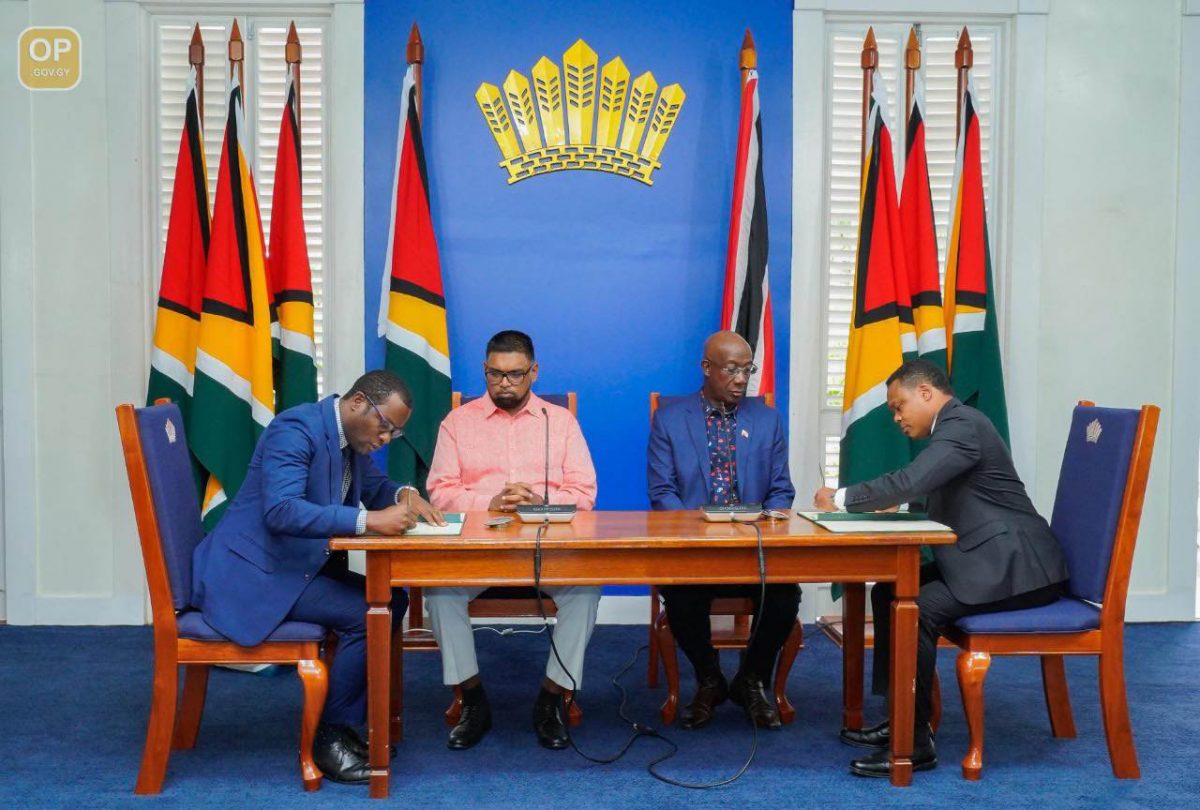The respective business communities in Guyana and Trinidad and Tobago would appear to be moving towards a resolution of the matter of Guyana’s sustained protestations over the non-tariff protectionist policies in place in the twin-island Republic which have seriously retarded the ability of some categories of Guyanese goods to make inroads into the T&T market.
While the exchanges between Georgetown and Port of Spain on the issue have, over time, often tended to shed more heat than light, country to country interventions at the diplomatic level notwithstanding, a crack would appear to have opened on the issue against the backdrop of the recently concluded high-profile 25 x 2025 Food Security forum in Georgetown, held to seek to properly align the position of the Community on its food security at a time when the issue looms large on the international agenda.
The two CARICOM member countries had appeared very much to be sitting on the issue up to a week ago when news that President Irfan Ali and Prime Minister Keith Rowley were about to sign a Memorandum of Understanding (MoU) on a range of issues in the realms of economic and technical cooperation provoked a feral blast from the Georgetown Chamber of Commerce and Industry (GCCI), which insisted that no such deal should precede the removal of the barriers that keep a range of locally produced goods off the Trinidad and Tobago market. The areas that had been identified for bilateral cooperation between the two countries had included agriculture, food security, energy, education, national security and tourism.
It appeared that the local Chamber of Commerce had taken a position that the keenness of Port of Spain to conclude such a MoU had at last provided a measure of leverage that might open the door in Trinidad and Tobago to a greater willingness to remove the non-tariff barriers, particularly those that apply to goods from Guyana deriving from its agricultural sector.
Whereas it is believed that in matters of trade and economic relations between Guyana and Trinidad and Tobago, the latter has long held the ‘whip hand’ on account of its oil wealth, Guyana’s own considerable recent oil finds have caused the country to become a lightning rod for local content opportunities and that this shift may now have caused Trinidad and Tobago to become more accepting of the broader advantages to be derived from removing its import barriers that have badly affected agricultural and agro-processed goods for which Guyana seeks to find a place in the Trinidad and Tobago market.
On his recent visit to Guyana to attend the 25 x 2025 forum, Trinidad and Tobago Prime Minister Keith Rowley, having faced questions from the local media about his country’s pushback against non-tariff imports from Guyana, was, nonetheless, able to sign on to a bilateral MoU with Guyanese president, Irfaan Ali, an indication that the Government of Guyana had decided to go the route of avoiding a bigger spat with Port of Spain over the issue of trade barriers.
Unsurprisingly, the Port of Spain business community, led by the Trinidad and Tobago Chamber of Industry and Commerce (TTCIC), earlier this week welcomed the signing of the MOU between President Ali and Prime Minister Rowley as what it sees as a significant step forward for trade and investment relations between the two countries. It is an encouraging pronouncement coming from the Trinidad and Tobago private sector, clearly aware of the fact that Guyana’s recently acquired status as an oil-producing country has created a quantum shift in business relations between the two countries, a circumstance that paves the way for improved relations in the area of bilateral trade.
The TTIC acknowledged in a release that “as a private sector organization that supports regional trade and investment,” it recognises that “one of the major pain points that must be addressed is non-tariff barriers (NTBs).” The statement added that the Chamber would welcome “an assessment of identified NTBs and looks forward to the findings as we move towards the realization of the objectives of the CARICOM Single Market and Economy,” a pronouncement that will been seen here as a vindication of the tough line taken by the GCCI on the signing of the MoU between the two countries.






